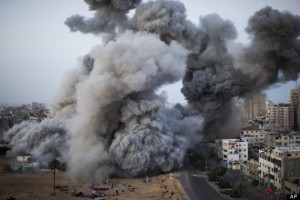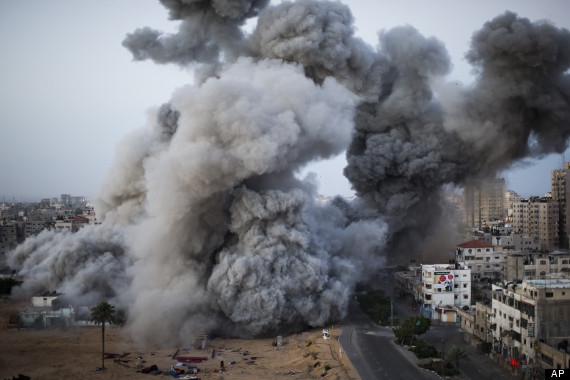
It was an unguarded comment that may have strayed close to the truth: Britain�s Chief Rabbi Jonathan Sacks said he believes tensions over Iran were behind the Israel-Gaza violence.
That remark � made in a radio studio when he thought he was off the air � echoes a theory that Tehran�s fingerprints are all over the current escalation of violence.
Realizing that�he was actually live on air, Sacks did not elaborate on his theory but Western intelligence agencies and the Israeli Defense Force (IDF) do agree that longer-range rockets being fired toward Tel Aviv are Iranian-manufactured Fajr-5 missiles.
The Fajr-5s are assembled locally after being shipped from Iran via Egypt�s Sinai region from where they are smuggled into Gaza through tunnels, theIDF says on its own public information site.
Israel believes weapons travel via Sudan � a theory underlined when it�launched airstrikes on an apparent arms factory there�last month, killing two people.
Two Palestinian militant groups - Islamic Jihad and Hamas - have claimed to have fired Fajr-5s.�Hamas calls its rockets "Palestinian made" and does not acknowledge receiving weapons from Iran, although it does refer to Iran as a "supporter of the resistance."
From Sudan to cyber, secret war with Iran heats up
A senior Iranian lawmaker has denied supplying Hamas with weapons. "We deny having delivered the Fajr-5 to the Palestinian resistance,� Allaeddine Boroujerdi, head of the Tehran parliament's foreign affairs committee said on Saturday,�according to the Daily Star newspaper in Lebanon.� He added that Hamas was �perfectly capable of producing the arms it needs.�
So who is telling the truth?
On Monday, the Wikileaks site reposted on Twitter a�link to a 2009 diplomatic cable, first leaked last year, detailing Israeli intelligence on how Iran was supplying Hamas with long-range weapons and how such artillery was being brought into Gaza.
That viewpoint is shared by retired General Barry McCaffrey, a security consultant and NBC News analyst, who�told MSNBC�s Alex Witt: ��I think the Iranians have manipulated particularly [Lebanon-based] Hezbollah but also Hamas. They've equipped them with significant amounts of rocketry. One of the unclassified figures was 120,000 rockets in either southern Lebanon or Gaza in the range of Israel, so the Iranians are actively promoting trouble in Syria and Lebanon and Gaza.�
Jane Kinninmont, senior research fellow at the British think tank Chatham House,�told�NBC News� U.K. partner Channel 4 News�there were some indications that shifting allegiances might point to Iran�s motives.
"In the background, for more than a year, Qatar, Jordan and other Gulf states have been trying to prise Hamas away from its recent alliance with Iran in return for stronger support from the Arab world," she said. �"Iran may be trying to wreck this by dragging Hamas back into a military conflict where it needs its Iranian rockets.�
Supporting that theory, Iran�s semi-official Fars news agencyon Sunday accused Qatar of helping in the killing�of Hamas military leader Ahmed Jabari by planting spy devices in Gaza.�It alleged that the emir of Qatar, King Sheikh Hamad bin Khalifa Al Thani, distributed watches and ballpoint pens among Hamas leaders when he visited the area in October, and that those items contained transmitters that emit signals to Israeli satellites.
Israel steps up targeted attacks in heavily populated Gaza; mediation efforts gather pace
But other experts believe Iran�s role in this particular outbreak of violence is overstated.
�It would not be a surprise but I think it is unlikely,� Ali Ansari, professor of modern history at St. Andrews University in Scotland and senior research fellow at Chatham House, told NBC News.
�I don�t think even Iran would be stupid enough to provide a pretext for a war with Israel, which is something neither side wants despite all the rhetoric.�
Daniel Levy, director for Middle East and North Africa for the London-based European Council on Foreign Relations, said: �Certainly Israel will be looking at the wider issues such as Iran but I think there�s a risk of reading too much into Iranian involvement.
�There�s a war of narratives going on here. Israel will tend to blame Iran for everything it can and vice versa.�
With the rise of Islamism in the wake of the Arab Spring, and the shift of its base from Damascus to Doha, Hamas has been less reliant on Iran, the main Shiite power in the region, for backing against Israel.
�Hamas is now firmly aligned with the Sunni Arab camp and can distance itself from Iran,� Levy noted.
So is the current violence really a precursor to a showdown with Iran? Unlikely, according to Ansari and Levy.
Yonatan Touval, a Tel Aviv-based analyst,�told the New York Times: �If Israel�s political leadership is treating the current operation in Gaza as something of a rehearsal for a future war with Hezbollah and Iran, it is rehearsing the wrong play.�
Nevertheless, Iran-Israel tension remains high. �Tehran is getting a bit of a break at the moment because all the attention is being focused elsewhere,� Chris Doyle, director of the�Council�for�Arab-British Understanding, told NBC News. �But if there is a truce agreement and current violence tails off, Iran remains the number one issue for Israel and the wider region.�
The Iran Project is not responsible for the content of quoted articles.











